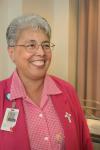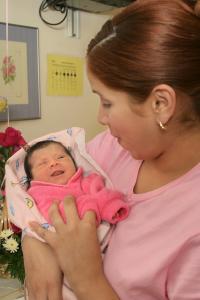|
Issue Date: February 20, 2004
By ARTHUR JONES It’s the ideal scene, and Sr. Martha Rojo of the Sisters of Providence sensibly revels in it. She’s holding a 2-day-old girl. The mom is beaming nearby; her bags are on the bed. Mom and baby are headed home. The new dad is bringing the car around. The outcome everyone prays for.
In other rooms along the same corridor, the stories are more tragic. “We have a very high risk population here,” said Rojo, St. Francis Medical Center chaplain, “stillbirths, miscarriages. More so than in suburbia because of the poverty here, the lack of insurance, even the lack of transportation, or just no child care.” For Rojo the work is far more than handholding. She copes by trying to find solutions in the midst of much grief. Some cases, she said, you don’t forget. The mom with a problem cervix who has lost five, six, seven children. “And now another. The boyfriend was nowhere around to comfort her. She had no family around. So lonely.”
Other patients have experienced losses of loved ones and relatives in wars in Guatemala or El Salvador. “They are numerous and they’re lonely and have no one to turn to. I think we try to give them some hope for the future.” She recalls “the lady who comes in and says, ‘My children have nothing to eat right now. Her husband, or whatever, has just left.” Rojo has access to emergency “tool kits” -- in effect a voucher system for essentials -- with food, clothing, transportation, even short-term emergency housing. Rojo knows that crossing the Mexico border is “rough and getting rougher.” There are pregnant women who brave desperate odds to cross the border so their child can be born an American citizen, and there are fathers who die trying to cross. Rojo has coped with a range of tragedies since she arrived at St. Francis Medical Center six years ago. She’s a former schoolteacher. Immediately prior to becoming a chaplain, she was a director of religious education working in Northern California with migrants. She moved south to be close to her ailing, elderly father. She had one unit of Clinical Pastoral Education when she began. She said with a laugh, “I did my CPE creatively, one unit a year.” Six years ago she was seeing 15 to 16 patients a day, now it’s 20 or more. She sees all the mothers with babies in the Intensive Care Unit, and all those with complications in pregnancy.
“We have a high risk section and it’s always busy,” she said. “Bed rests, because their membranes have ruptured at 22 weeks and we try to hold them to at least 24 weeks for a possibility of life.” California regulations cover all mothers-to-be for childbirth and prenatal visits, whether they are citizens, documented or undocumented immigrants. “So my first assessment is usually for safety [in the home],” said Rojo. “There’s a lot of abuse. I like to know who they live with. I have printed materials referrals, hot lines, etc. A booklet from the American Bible Society, ‘The Lord Hears Your Cry,’ about being in an abusive situation. You give them an education and refer them to a social worker as an active case.” Stillbirths and newborn deaths are hard on the parents and the chaplain. “The nursery has a whole memorial box -- they do the footprint, they do the weight, they do everything. The mom holds the child. It’s a good way to say goodbye or hello,” she said. “And you’re just there with the mom, to listen. Her feelings are, ‘Maybe if I had taken my [prenatal] vitamins, maybe if I had not gotten angry, maybe, you know, this wouldn’t have happened.’ “Or they think God is punishing them,” said Rojo. “Or they say, ‘Why do the drug addicts throw away their babies and I lost mine?’ They’re searching for a meaning, it’s a sense of desperation.” Rojo would have accompanied, counseled and consoled the young mother whose son, Angel, was in the white zipper bag in the morgue (NCR, Jan. 23). Organizationally there’s a cross-referral relationship between the Family Life Center and Gilda Acosta-Gonzalez’s mobile clinic and St. Francis Medical Center’s satellite clinics, as well as with the Career College. LVNs gain part of their clinical experience in the Family Life Center setting. Rojo is constantly plugged into St. Francis’ “Footprints” resource center in the building next door, because so many of the moms-to-be have other children, kids in need of shoes and clothing. Rojo’s work often is outside the formal structure. “I have to treat the whole person, and if there’s a problem that’s unsettling them or will be in the future, I’ll try to help them out,” she said. “For example, within the last week I had a mom and she had a loss [stillbirth] and her record says ‘self paid.’ And she’s very concerned because, she said, ‘I have to have a good credit rating.’ And so it ended up that I walked her over to the finance office and they reduced the price considerably, and made it into affordable monthly payments.” She nodded her head, “Yes, we do take some charity cases. “Or there’s the mom of a guy that’s been shot, and she came from Mexico. He lived far from here and was visiting friends when he was killed. She wouldn’t have housing for a few days. We gave her a voucher so she could stay at a hotel, meanwhile, and Resources gives her a note to pass the border going back home.” Every step along the corridor was another story. A happy ending to the happy beginning at the top of this story: The young dad had the car ready; the little new family was headed for home. National Catholic Reporter, February 20, 2004 |
 Chaplain sees grief, joy in St. Francis' corridors
Chaplain sees grief, joy in St. Francis' corridors
